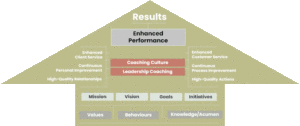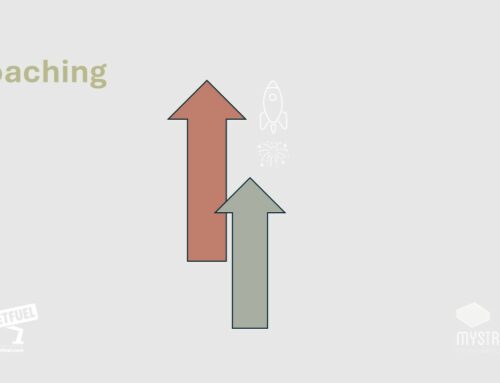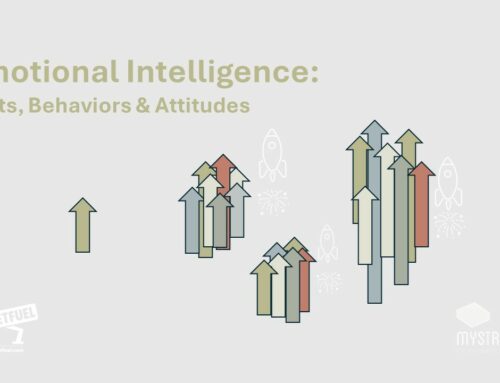
Are we ‘giving people fish’ through endless instruction, or ‘teaching them to fish’ through continuous coaching at work, asks Leadership & Performance Coach, Davina Greene.
The International Coaching Federation (ICF) defines coaching as partnering with clients in a thought-provoking and creative process that inspires them to maximize their personal and professional potential. More familiar from the world of sport, coaching has been seen to work exceptionally well in business, with former Google CEO Eric Schmidt being a huge early advocate.
In strong organizations, there are two angles to Coaching at work – targeted Leadership Coaching at more senior levels, but also a Coaching Culture based on a ‘coaching style of management’ for all. This means that, from top to bottom, the opportunity is there to learn and grow, and demonstrate accountability for same.
How Can Coaching Help In The Workplace?
Coaching at work can help add rocket fuel to an organization, created by the accumulation of smarter efforts by everyone. It has proven impacts across Productivity and People, and organizations tend to perceive a strong ROI on coaching investment.
A report by the International Personnel Management Association showed that when training is combined with coaching, individuals increase their productivity by an average of 86% (as compared to 22% with training alone). This shows not only the benefits of a Leadership Coaching service for managers, but also of Managers coaching their agent-level team members to embed and build upon Learning initiatives undertaken.
One study of Management coaching in a Fortune 500 firm, by Metrix Global, reported a 529% return on investment and significant intangible benefits to the business.
What Areas Can Coaching Help With In The Workplace?
Self-Knowledge & Team Development
Managers need to understand their surroundings and their impact on same, from both the business and interpersonal angles. Self-awareness often exists (“I know I do that thing”), but without self-knowledge (“I know why I do that thing”). In the absence of self-knowledge, bad habits are harder to break.
Once you understand yourself, it is far easier to build bridges within your team, best allocate resources to suitable tasks, communicate more effectively, and generally remove interpersonal barriers to success. One ICF survey reported 70% claiming improved productivity and collaboration in coaching-orientated organizations.
Management Development
In a business built significantly on first-time Managers, support for quick mastery of the role is vital. Coaching at work – via coach or manager – is a great tool for continuously discussing all aspects of Management so that all areas are developed (rather than just favorite or most natural areas). In outsourcing companies in particular, we run the risk of an account-specific understanding of Management, rather than people engaging in the full spectrum of what Management means.
A survey conducted in 2020 by the Society for Human Resource Management found that 84% of American workers believe unskilled managers create unnecessary work and stress. The same study showed that 50% of workers believed their own performance would improve if their manager had additional development.
Business Acumen & Results
To play a role in the further development and success of a business – which is, after all, what being part of a Management structure is all about – there are a lot of things you need to know. You will be better at some areas than you are at others, but you need to understand the bigger picture within which you operate. Some of this will come from training, of course. However, the sewing together and true understanding of these learnings will often come from ongoing discussion and challenge. This is where coaching plays a role.
According to one ICF study, Building Strong Coaching Cultures for the Future, 76% of all Coaching conversations were proactively about how to solve business problems.
Strategy & Growth
Coaching at work is beneficial for managers who are, by definition, supposed to be playing a role in driving strategy forward, designing activities, making decisions, and keeping activities on track.
Especially in heavily operational environments, it can be difficult to break the efficient ‘operational trance’ and unleash imagination. Without imagination, there is no strategy. Coaching at work provides a useful space to get people to think laterally and ‘outside the box’. Surveys have shown that 48% of organization see a positive link between revenue and coaching culture.

Coaching Culture supports Strategy
Engagement & Retention
All of the above constitute more lateral thinking and a sense of increased involvement. Additionally, coaching at work can help with specific Wellbeing-related behaviors such as Confidence and Resilience, by keeping continued focus on them with the person until resolved (or significantly improved).
In addition, one study showed that 65% of organizations saw direct impact on retention from coaching at work; 61% saw an increase in general job satisfaction.
Conclusion
We all know the saying “Give a man a fish and you feed him for a day; teach a man to fish and you feed him for a lifetime.” When we do nothing but instruct, give and fix, we create short-term solutions, embed learned helplessness, and dilute the identification (and potential brilliance) of future stars. However, when we zoom out, probe and challenge, we discover and nurture new stars – often with a huge amount of the necessary skills, attitudes, and business instincts in place already – and the benefits for all involved are both long-term and significant.
Good conversations change cultures, and strong cultures get great results. We come to work to achieve great results, business and personal (certainly, our leaders – present and future – must feel that way). That said, if we always do what we’ve always done, then we’ll always get what we always got.
So let’s start getting creative.
Interested in investing in your own personal – and personal strategy – development? Check out www.MyStrategy.me!
Share This!
About the Author





